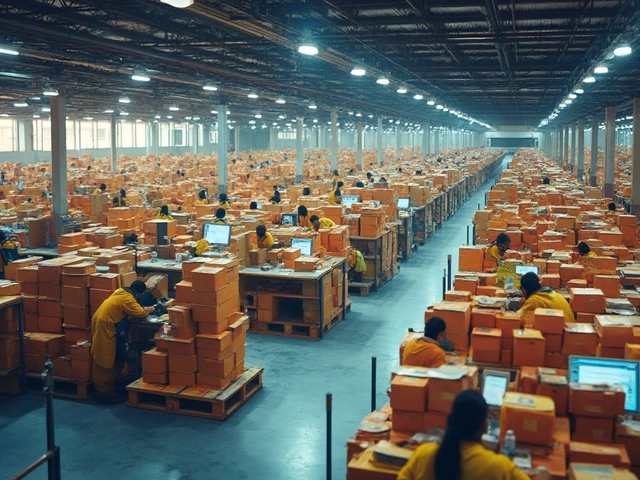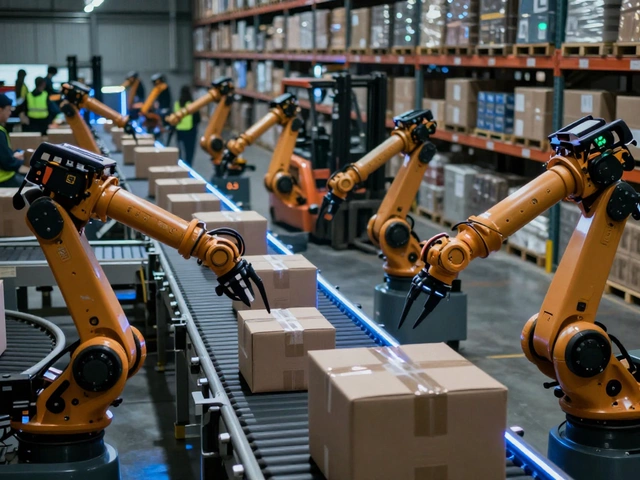The logistics industry is a vast and dynamic field that attracts many individuals for a myriad of reasons. It's not just about moving goods from point A to B; it's about orchestrating a complex dance of supply and demand, ensuring that the right products reach the right places at the right time.
Logistics plays a crucial role in the global economy, and careers in this sector offer a unique blend of challenges and opportunities. Whether you're interested in supply chain management, transportation, warehousing, or distribution, there are numerous pathways to explore.
As technology continues to evolve, logistics is at the forefront of innovation, with advances such as automation, data analytics, and AI shaping the industry. Those who thrive in logistics possess a keen sense of problem-solving, adaptability, and a passion for efficiency.
Job security is another appealing factor, as the need for skilled logistics professionals remains steady regardless of economic fluctuations. And with a wide scope of areas to specialize in, the potential for career growth is substantial. Understanding why people are drawn to logistics involves looking at the diverse opportunities, the impact of technology, and the essential skills required to succeed in this ever-evolving field.
- The Allure of the Logistics Industry
- A Breadth of Opportunities
- Embracing Technology in Logistics
- Skills That Matter
- Job Security and Growth
- Future Trends in the Logistics Sector
The Allure of the Logistics Industry
The logistics industry, often described as the backbone of global trade, holds a special allure for those with a knack for organization and efficiency. At its core, logistics is about the smart coordination of complex networks functioning behind the scenes to deliver all manner of goods to the places where they are needed most. This industry offers a wealth of opportunities for those who are attracted to dynamic work environments and enjoy being part of a process that has tangible, real-world impacts. It's a field where things are constantly moving and no two days are ever the same. For instance, the heart of logistics revolves around problem-solving – each shipment, route, and delivery brings a new puzzle to be solved.
People who dive into logistics careers often talk about the diversity of roles available as a key attraction. Logistics encompasses a variety of functions, such as supply chain management, warehousing, transportation, and inventory control. Each of these areas provides its own unique set of challenges and learning opportunities. For example, in supply chain management, professionals are tasked with ensuring smooth coordination between suppliers, manufacturers, and retailers, often using cutting-edge technologies to optimize the process. This variety ensures there’s always room to grow and learn new skills, which is particularly appealing to those who thrive on continuous improvement and are passionate about lifelong learning.
A significant aspect that makes the logistics sector compelling is its intrinsic connection to globalization. An enticing factor for many is the chance to engage with international markets, allowing professionals to witness firsthand how goods traverse borders, cultures, and economies. With global e-commerce sales expected to reach $6 trillion by 2027, the demand for efficient logistics solutions continues to intensify. This presents a thrilling landscape for logistics experts who seek to contribute to and innovate within a globalized economy. Not only does this hub of activity keep work stimulating, but it also offers a sense of global citizenship, knowing that goods delivered efficiently help improve lives worldwide.
"Logistics is more than just a job; it's a fast-paced, ever-evolving industry that relies on innovative thinkers," says a leading expert at the International Federation of Freight Forwarders Associations. This sentiment captures the broader appeal of logistics as an arena where creativity and analytical skills are prized attributes. Those who enjoy building relationships will also find fulfillment in logistics, as it frequently requires collaboration with diverse teams across various geographical locations. Many companies foster an environment where teamwork and a solutions-oriented mindset are integral to success, further appealing to those who value a collaborative work culture.While the logistic industry can be demanding, with its share of deadlines and time-sensitive tasks, for those who are detail-oriented and enjoy managing projects, this high-stakes environment can be quite rewarding. There's a certain satisfaction in knowing that you play a crucial part in ensuring products reach consumers in a timely and efficient manner. The logistics field not only satisfies those who find joy in complex problem-solving but will also excite those compelled by the challenge of ensuring maximum efficiency within an ever-changing landscape.
A Breadth of Opportunities
In the multifaceted world of logistics, there's a myriad of career paths that cater to various skillsets and interests. One might find themselves intrigued by the strategic and analytical aspect of logistics careers, delving into the intricate web of supply chains that keep businesses running smoothly. Others might be drawn to the hands-on roles that involve the day-to-day operations of supply chain jobs, such as warehouse management or transport coordination. What makes the logistics field particularly appealing is the possibility for individuals to find a niche that not only suits their competence but also aligns with personal career aspirations.
For those with a penchant for technology, the logistics industry presents a playground of innovation where digital logistics platforms and advanced tracking systems come to life. The adaptation and integration of these technologies have created roles dedicated to enhancing operational efficiency and optimizing distribution networks. People working in this area often collaborate with cross-functional teams to leverage data-driven insights, all to ensure seamless execution of logistics industry operations. According to a report by the Chartered Institute of Logistics and Transport, the incorporation of technology into logistics not only boosts efficiency but also significantly reduces operational costs—an enticing factor for businesses aiming to stay competitive.
The logistics sector is not just about processes and technology; it is also about people. Human resources play a vital role in the smooth and efficient functioning of logistics companies, with roles ranging from talent acquisition to employee training and development. These individuals are the backbone of working in logistics, ensuring that everyone in the logistics chain is equipped with the right skills and knowledge to contribute effectively to their teams. The global nature of logistics means that this sector offers international opportunities, allowing professionals to work in diverse cultures and environments, thus enriching their professional experiences.
It's noteworthy that logistics is an industry that continuously adapts to consumer demands and market trends, thus creating new job roles and career paths. The shift towards e-commerce logistics, for example, has given rise to specialized roles that focus on last-mile delivery solutions. This surge in e-commerce has led to logistics companies pioneering sustainable practices, offering roles that specialize in eco-friendly packaging and transportation solutions. This expansion of roles not only benefits the environment but also attracts individuals passionate about sustainability and green innovations. As stated by a survey conducted by the World Economic Forum, sustainable logistics is one of the top concerns for businesses in 2025, indicating a growing trend towards eco-conscious practices.
The broad spectrum of opportunities within the logistics industry makes it an attractive field for both newcomers and seasoned professionals. From entry-level positions to executive roles, the industry offers a ladder of career progression that is both rewarding and challenging. So, whether one is just starting their career journey or looking to pivot to a different sector, logistics provides a wealth of possibilities that cater to diverse aspirations and skills. Embracing these opportunities can lead to professional growth and a deeper understanding of the global economy—which is intricately tied to the ebbs and flows of international trade and commerce.

Embracing Technology in Logistics
In the rapidly evolving world of logistics, technology serves as a cornerstone for both transformation and efficiency. It acts as a catalyst, streamlining processes that were once bogged down by manual inputs and slower response times. Today, technology in logistics encompasses a vast array of tools and systems, ranging from automated warehouses to sophisticated predictive analytics that enhance supply chain visibility. As the industry continues to grow, embracing technology is not just an option but a necessity for staying competitive in the fast-paced market.
The demand for real-time data has led to the widespread adoption of Internet of Things (IoT) devices across logistics operations. These smart devices capture critical information throughout the supply chain, from tracking shipments to monitoring vehicle performance. These innovations help businesses react swiftly to any disruptions, ensuring that solutions are in place before problems escalate. According to a recent report by Gartner, IoT in logistics is expected to grow exponentially, offering a projected value of over $1.9 trillion by 2035.
Automation is rapidly becoming an integral tool in supply chain jobs, enabling logistics companies to operate more efficiently and cost-effectively. Automation technologies, such as robotic process automation (RPA) in warehousing, reduce human error and increase productivity. For instance, using robots for picking and packing operations can significantly enhance accuracy and speed, boosting warehouse efficiency. Moreover, advanced automation systems also alleviate the labor pressure faced by many logistics firms, thus enabling them to redirect human resources to higher-value tasks.
Another technological marvel taking the logistics world by storm is blockchain. Known for its ability to provide an immutable ledger, blockchain technology ensures transparency and security in transactions. This secure data interchange has potential applications from tracking shipments to facilitating trust in international transactions. As quoted by Supply Chain Dive, "Blockchain possesses the potential to significantly reduce transaction disputes by enabling a unified, trusted bookkeeping system accessible to all parties involved." This dramatically reduces disputes and ensures that transactions proceed smoothly and without unnecessary delays.
Not to be overlooked are data analytics and artificial intelligence (AI), which are rapidly transforming decision-making processes within logistics careers. With the aid of predictive analytics, logistics companies can make informed decisions that anticipate market trends and consumer demands. AI algorithms help optimize routes, thereby reducing delivery times and fuel consumption, leading to both economic and environmental benefits. A McKinsey report found that companies utilizing AI for demand forecasting observed a 50% reduction in lost sales and a 20% reduction in warehousing costs.
It is clear that technological advancements are not only reshaping logistics but also redefining the skillsets required in the industry. As logistics industry professionals continue to embrace new technologies, they must also be adept at handling data-driven decisions and maintaining cyber-resilience to safeguard digital infrastructures. Consequently, continuous learning and adaptation are paramount for those aspiring to excel in this field. By leveraging these technological tools, logistics firms can enhance their operations, improve customer satisfaction, and ultimately solidify their place in the global marketplace.
Skills That Matter
When you consider a career in the logistics industry, understanding and acquiring the right skills can mean the difference between just getting by and truly succeeding. Acquiring these skills is not just about formal education; it's about nurturing the abilities that will help you thrive in a sector that demands precision and adaptability. A keen understanding of supply chain logistics can directly impact the success of a business, making logistical skills invaluable in today’s interconnected world.
Real-world problem-solving is at the heart of logistics. Whether you're optimizing delivery routes to reduce transportation costs or managing inventory levels to meet market demand, you'll need to think critically and creatively. This dynamic field challenges you daily to find innovative solutions to complex problems. Excellent communication is also crucial since logistics professionals regularly interact with suppliers, customers, and team members across various geographies and cultures.
Technology and Analytical Skills
With the industry increasingly driven by technology, proficiency in digital tools and data analysis has become essential. From warehouse management systems to real-time tracking software, embracing technological advancements can significantly enhance efficiency. Strong data analytics skills will enable you to make informed decisions based on trends and performances, which is crucial for optimizing operations and reducing costs.
It’s a fact that companies like Amazon rely heavily on logistics professionals with strong technological know-how to manage their vast network of fulfillment centers. According to a report by DHL, technology has become a catalyst for change, with nearly 85% of logistics specialists emphasizing the need for advanced technological skills moving forward.
Leadership and Team Collaboration
Leadership capabilities are also highly valued in supply chain jobs, where managing teams and projects is common. Whether leading a team of drivers or coordinating operations within a warehouse, the ability to motivate and guide colleagues is essential. Innovative leadership can transform workflows and improve productivity, making teams more cohesive and effective.
This is supported by a survey from the Global Supply Chain Institute, which indicated that 59% of logistics professionals believe that developing leadership skills is critical for career advancement within the industry. As logistics grow ever more complex, the importance of fostering a collaborative spirit within teams cannot be overstated.
In conclusion, the skill set required for a career in logistics is as diverse and dynamic as the industry itself. Professionals looking to excel will benefit from nurturing a mix of analytical skills, technological proficiency, effective communication, and the ability to lead and collaborate effectively. These skills not only contribute to individual success but also to the overall efficiency and innovation of the logistics industry.

Job Security and Growth
When contemplating a career path, the notion of job security often comes into sharp focus. The logistics sector has consistently stood as a reliable pillar of employment, safeguarding countless professionals against the shifting tides of economic change. As industries around the globe continued to digitize and expand, logistics consistently adapted, integrating cutting-edge technology to ensure its seamless operation. The resilient nature of logistics careers has been widely recognized, given that even during the peaks of global disruptions, goods still require transportation, storage, and supply coordination, thus maintaining robust opportunities within the industry.
Perhaps one of the most comforting aspects of a career in logistics is the universal need for these services across multiple sectors. Corporations, both burgeoning and established, require skilled individuals who can manage the complex web of supply chains efficiently. In a conversation with The Chartered Institute of Logistics and Transport, a representative once mentioned,
Logistics has become central to virtually every business model, acting as the lifeline that links production and consumption across geographies.This assertion rings truer now than ever, with businesses relying heavily on adept logistics professionals to uphold their operational success. By choosing this field, enterprising individuals enjoy a broad array of career paths within specialized areas such as inventory management, procurement, and supply chain optimization.Growth potential in the logistics sector is another compelling reason many are drawn to it. Data compiled by the Bureau of Labor Statistics suggests that employment roles within logistics and supply chain management are projected to grow by 4% over the next decade. With automation steadily transforming warehouse operations and AI optimizing route calculations, logistics experts find themselves in the exciting position of regularly learning and adapting new skills. Organisations frequently offer training programs that emphasize continuous professional development, ensuring that employees remain at the leading edge of industry trends and technologies. This nourishes not just immediate job security but also long-term career development.
Aside from professional development, working in logistics often brings tangible personal growth. Navigating the intricacies of a global supply network requires a combination of strategic thinking, adaptability, and decisiveness—skills that are applicable both within the realm of supply chain jobs and beyond. Engaging daily with such a vital and impactful aspect of modern commerce pushes individuals to enhance their problem-solving capabilities and build resilience in the face of challenges. With the logistics industry set to flourish in the coming years, those who dedicate themselves to mastering its complexities can anticipate a fulfilling career replete with security, variety, and potential for growth.
Future Trends in the Logistics Sector
As we progress further into the 2020s, the logistics industry is poised for significant transformations driven by both technological innovation and evolving consumer demands. One of the key trends is the increasing integration of autonomous vehicles and drones in the transportation of goods. While still in nascent stages, companies are actively testing and implementing self-driving vehicles for deliveries, promising not only to save costs but also to increase efficiency and safety in supply chain logistics.
Additionally, the wider adoption of artificial intelligence (AI) and machine learning is reshaping how logistics companies manage their operations. These technologies allow for predictive analytics, enabling businesses to forecast demand more accurately and optimize their inventory levels accordingly. Enhancing decision-making processes, AI can also identify inefficiencies in the supply chain, facilitating a more streamlined and responsive operation.
One industry expert from Deloitte indicates, "AI has the potential to revolutionize logistics, turning data into actionable insights and dramatically improving supply chain resilience."Another emerging trend is the growing emphasis on sustainability. Consumers are increasingly conscious of the environmental impact of their purchasing choices, prompting logistics companies to adopt greener practices. This may include investing in electric vehicles, utilizing biodegradable packaging materials, or optimizing routes to minimize carbon emissions. These efforts not only cater to consumer preferences but also help companies reduce costs in the long run.
Furthermore, there is a noticeable shift towards more localized, agile supply chains, a trend exacerbated by recent global disruptions such as the pandemic and geopolitical tensions. Companies are exploring ways to bring production and distribution closer to end consumers, thereby reducing reliance on long, complex supply chains that are vulnerable to external shocks. In this context, digital platforms that connect consumers with local suppliers are set to gain prominence.
To summarize these insights, it's evident that the logistics sector stands at a crossroads, driven by technology, sustainability, and agility. The need for expertise and innovation in logistics careers is as critical as ever, as the industry navigates this dynamic landscape. As these trends unfold, they present opportunities and challenges alike, urging stakeholders to adapt swiftly to thrive in the future economy.





